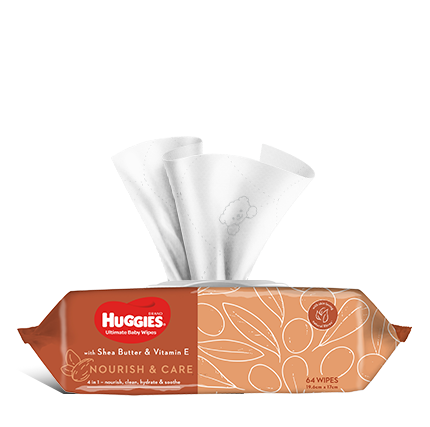You will probably find your 4 week old baby is looking more unique with each day that passes. Its mottled skin, puffy eyelids and peeling skin-if it was overdue, will all be settling down by now. Your baby will also be moving more actively and stretching out its limbs more than it has been. It is still too early for your baby to have control over its limb and body movements but it won’t always adopt its once familiar foetal position all the time.
The shape of your baby’s head will be changing now as well. If you had a vaginal delivery your baby’s skull will have needed to mould itself to fit through your pelvic opening. By four weeks its head will take on a more rounded and symmetrical shape.
Your baby may still retain some of its lanugo (soft, downy hair) on its skin, particularly over its shoulders and back. But this will soon be shed. Lanugo will be more obvious if your baby was born prematurely or its hair is darkly pigmented.
Feeding
Don’t worry if your baby has small spills or posits of milk after they have fed. The valve at the top of a newborn’s stomach is often a little relaxed and milk can easily regurgitate back up the oesophagus (food pipe). A small amount of milk can spread a long way, so get into the habit of keeping a hand towel close to mop up spills. Unless your baby is failing to gain weight, is projectile vomiting or failing to thrive, try not to be concerned.
If you are breastfeeding you may find your supply is a little lower in the evenings. Having an afternoon lie down or sleep can really help to boost supply. It is easy for new mothers to skip meals and to become very focused on their baby. But it is important for mothers to maintain a steady blood sugar and eat an adequate amount of energy dense, healthy foods so they can lactate sufficiently.
Sleeping
Your baby may be happy being awake for a little longer after feeds this week. Your baby’s personality and temperament will already be evident, even at this early stage. Some babies are naturally more placid and calm and generally easier to “read” than others. Some demand more attention and need more cuddles and calming down. At this age, your baby cannot regulate their own emotions and will need your help to do this.
They will need to be calm and relaxed before they drop off to sleep. Rocking, soothing, shshshing, patting and generally giving them the message that you are close will help them feel secure enough to relax enough to go to sleep.
Behaviour and development
This is the week when you are likely to hear your baby start cooing and making little noises. These early, pre-verbal attempts at speaking will be their way of building skills in communication. Engage them by getting up close to their face, looking at them and delighting in their chatter.
It is still a little early for any true smiles just yet, but you may find your baby grimaces and scrunches up their little face. If they have a pain, are hungry, tired, bored or even during their sleep, their range of facial expressions will amaze you.
Your baby may be able to lift their head for a short period when they are lying on their tummy. It is important to provide them with some supervised tummy time every day. This will help them to build strong muscles in their neck and chest.
Nappies
By now you will be in a finely tuned pattern of nappy changing. Your baby’s output will give you an indication of just how well they are feeding . One of the signs of sufficient milk intake for a breastfed baby is if they are having 6 or more, pale wet nappies every 24 hours. Their bowel motions should be soft and mustard yellow.
If you are formula feeding , don’t be concerned if your baby does not have a bowel motion every day. As long as the consistency is still soft your baby is not constipated.
Hygiene
Some babies have moist or sticky eyes at around 4 weeks. Occasionally there is a discharge from one or both eyes. Cleaning the eyes from the inside corner to the outside with warm, fresh tap water is helpful. Occasionally a blocked tear duct or even a bacterial infection is the cause. Check with your doctor if your baby’s sticky eyes have not cleared up by now.
If your baby is a boy there is no need to pay any particular attention to his foreskin. It will gradually separate from the glands of his penis by the time he is around 4-5 years of age.
If you have older children, it may be more practical for you to bath the baby with the others. They are likely to want to help, so stress the importance of being gentle and keeping water away from the baby’s face. Alternatively, you may prefer to bath your newborn separately and for the sake of your back, place their bath on a table.
Your emotions
You may be feeling very tired by week 4. The reality of getting up through the night, having broken sleep and the constant demands of baby care can be very draining. Try to remember that this stage does not last for long, although it may seem like it at the moment.
It is important to look after yourself, not skip meals, rest when you can and aim for a simple life. This is not a time to compare yourself or your baby with others. Everyone’s experience of early parenting is unique.
At 4 weeks post partum, there are likely to be times when you feel overwhelmed with love for your baby and others where you may even feel ambivalent. Every new mother experiences fluctuating emotions which can be almost frightening in their intensity.
Your hormones will still be stabilising after the pregnancy and birth and it may take a few more weeks before you feel you are on more of an even emotional keel. Speak with your partner, your child health nurse or you GP about how you feel.
Your physical recovery
By now, you are likely to be feeling physically stronger. If you had a vaginal delivery, your uterus and internal organs will almost be back to their original position in your pelvis. If you had a caesarean section delivery, your recovery will be a little slower. Your abdominal scar will be healing at this stage but it will remain a little tender for a few more weeks. As long as it is clean, dry and healing- don’t be concerned.
What about dad?
Your baby will respond equally to both of you, if you both share in its care. Babies benefit from seeing their dads in a nurturing, caring capacity so try not to always be seen as the expert. Encourage them to get to know each other as well especially if dad is a bit reluctant at first.
For more information see Baby weeks or Baby Care.
Last Published* May, 2024
*Please note that the published date may not be the same as the date that the content was created and that information above may have changed since.




















